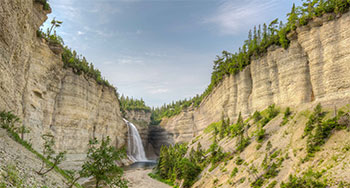Anticosti, Quebec
Quebec
Date of inscription: 2023
Located in the Gulf of St. Lawrence in Québec, Anticosti covers a territory of 9,289 km2 with a coastline that extends over 550 km. Anticosti is the most important stratigraphic record in thickness in the world, as well as the most complete fossiliferous record of this time.This interval of the Earth’s history has not been represented to date on the UNESCO World Heritage List.

Justification of Outstanding Universal Value
Anticosti was inscribed on the World Heritage List by the World Heritage Committee under the following criteria:
Criterion (viii): Anticosti is the best natural laboratory in the world for the study of fossils and sedimentary strata from the first mass extinction of life, at the end of the Ordovician period, which represents an important milestone in the history of Earth.
It contains the largest stratigraphic record in thickness and the most complete, and best-preserved fossil record of marine life covering 10 million years of Earth history, from the Upper Ordovician to the Lower Silurian, 447-437 million years ago. The abundance, diversify, and state of conservation of the fossils are exceptional and allow for world-class scientific work.
Full description
Anticosti is a stratigraphic and fossiliferous site of worldwide importance with an exceptionally well preserved, abundant, and diverse fossil fauna. Anticosti is the largest stratigraphic record in thickness and the most complete and best preserved palaeontological record representing the first mass extinction of animal life on a global scale, 447-437 million years ago.
The island’s exceptional paleontological record has been recognized for over a century and continues to attract prominent Canadian and international researchers. Studying this period enables us to better understand and learn from the profound climate changes that our planet underwent during the Ordovician-Silurian period.
Related links
- Tr’ondëk-Klondike, Yukon
- Writing-on-Stone / Áísínai’pi
- L’Anse aux Meadows National Historic Site
- Nahanni National Park Reserve
- Dinosaur Provincial Park
- Kluane / Wrangell-St.Elias / Glacier Bay /...
- Head-Smashed-In Buffalo Jump
- SG̱ang Gwaay
- Wood Buffalo National Park
- Canadian Rocky Mountain Parks
- Historic District of Old Québec
- Gros Morne National Park
- Old Town Lunenburg
- Waterton-Glacier International Peace Park
- Miguasha National Park
- Rideau Canal
- Joggins Fossil Cliffs
- Landscape of Grand Pré
- Red Bay Basque Whaling Station
- Mistaken Point
- Pimachiowin Aki
- Date modified :